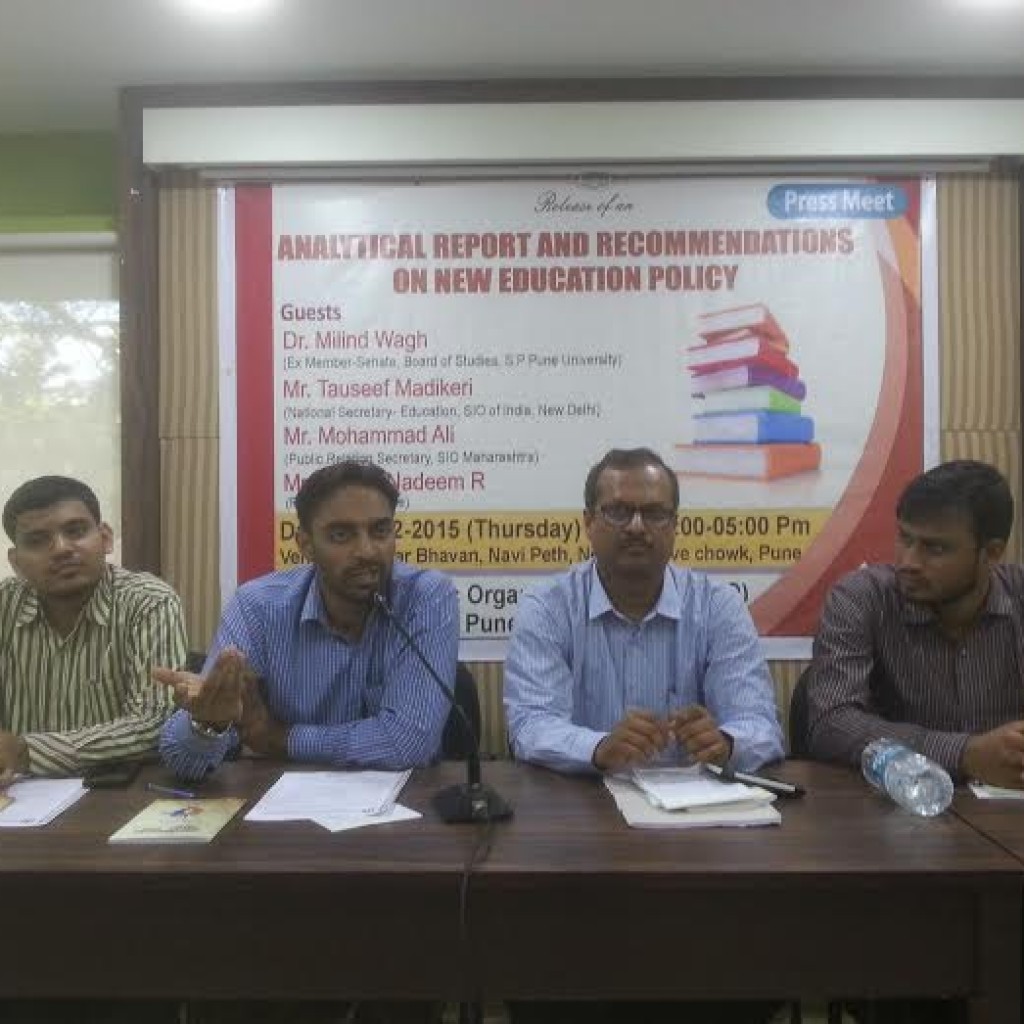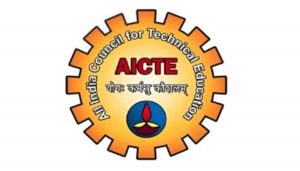Proposed Recommendations on New Education policy 2015 by SIO of India

Pune – Mr. Shaikh Nadeem President of Student Islamic Organisation (SIO) Pune chapter addressed media on Thursday about the recommendations and said that there were consultation programs done by SIO at 19 different places with Professors, academicians, students and other Student organizations’ and Report is drafted to MHRD and state Education department as part of Suggestion For New educational policy 2015.
On this occasion, Chief Guest Mr. Milind Wagh (Ex Member-Senate, Board of Studies, Savitribai Phule Pune University) congratulated the student body for preparing the document and said that “The New National Education Policy must simultaneously achieve four objectives – Equity, Access, Excellence and Employability. Promotion of communal harmony, secularism, national unity and integration, social justice, gender justice, tolerance and respect for pluralism and diversity and peace in the world must be the guiding purpose of the system of education at all levels.”
He added, the intervention of GATT(now WTO)in every sector including public sector .Why WTO wants FDI in education, is a long theory to discuss but he explained the clause of agreement “ we will do investment for commercial education “i.e commercial education will replace free and quality education. The poor and middle class students will not get it easily, Mr. Tauseef Madikeri Campus Secretary SIO Of India, raised serious consensus on the market oriented up gradations of educational policy in third decade of economic reforms, where Private stakeholders in both school and higher education on name of philanthropic approach adopting the responsibility of education by removing it from shoulders of government, and this philanthropic understanding of today’s time is much dominated by corporate players who are influencing on curriculum reforms rather infrastructural based on their market policies.
Today government is cutting grants on schemes at different levels, and at many places faculties are recruited on contract basis by demoralizing their responsibility, it became very difficult to distinguish economic and educational discourse, it is mixed in totality and results are expected in the same way which is not possible, since education is gradual process to build community and nation besides helping for employability, many courses we have neglected in humanities by assuming it as non-employable course in higher and school
education, if we want to progress then we also need to have good understanding on subject of humanities.
Mr. Mohammad Ali (Public Relation Secretary SIO Maharashtra) said Experimental testing can be possible in analytical subjects of mathematics’ and physical science but same tools cannot analyse the progress in social science, Very important provision of No detention in RTE is misplaced where it does not stop for No-Evaluation, and if this No Detention policy is dropped then it directly affect underprivileged section of society.” Emphasizing on Teacher Education he said that it need to be formally facilitated by the government under higher education. Also, he opposes the common curriculum for universities where university are centers to bring new research and intention of the government to standardized university education is nothing but cultural Revivalisms and we need to be much careful in it.
Release of an Analytical Report & Recommendations on New Education Policy
Education has always been important and it is crucial for the entire developmental process of a country, its welfare and progress. Progress is a continuous, never ending process. An advance in a particular field of activity leads to the opening of another door to proceed steadily for progress. Government of India drafted the education policy in 1986 and revised it in the year 1992. During this last 22 years, we have slowly but steadily marched on the road of planned progress. According to sources, Government of India will formulate the new education policy in the month of December, 2015.
Students Islamic Organisation of India organized around 19 discussions on New Education Policy in different cities, conducted an online survey and consulted around 20 Educationists to draft New Education Policy recommendations.
The Draft Education Policy recommendations are categorized into School Education, Teacher Education, Vocationalization, Language Policy, Higher Education, and Technical Education & Research in Higher Education.
Specific Recommendations
School Education
Educational policy should aim to imbibe the constitutional values, particularly the four core principles of constitution.
The policy should aim to provide equitable quality education to all children without any stratification and discrimination.
To achieve social inclusiveness and national integration, curriculum should reflect the plural culture of India. It should cultivate scientific temper.
The policy should aim to provide free and compulsory education to all children up to the age of 18 years.
New Education Policy should ensure that physical activities in school are promoted for the health and wellbeing of pupils.
Mother tongue should be the medium of education in primary school.
New Education Policy should aim to address the issue of commercialization of education.
Protection of environment & natural resources should be the major objective of school curriculum.
Restructure and rebuild the Indian education system on the lines of the Neighborhood School System to ensure equitable and quality education to all children irrespective of their sex, caste, place of birth, social and economic status.
Teacher Education
Undertake monitoring exercise in a mission mode across states to inspect teacher education institutes and make recommendations within a stipulated time frame.
Assist states in developing realistic estimates of requirement of institutional capacity to meet the growing demand for professionally qualified teachers at all levels of school education.
Take necessary steps to ensure that states augment institutional capacity for pre-service education through the expansion of the state system of DIETs and more importantly through the undergraduate system of higher education.
All new teacher education institutes should not be stand-alone. They should be located in colleges of undergraduate studies and in universities. In a recent initiative, Bihar has invited undergraduate colleges of education in the state to offer teacher education programmes.
Existing institutions that are essentially stand-alone will be required to make the transition within a stipulated time frame of a maximum of 3 years. Support will need to be provided towards such a transition within each state.
Deployment of faculty from departments of social sciences, sciences and other fields should be encouraged so that teacher education does not remain stand-alone even within undergraduate college and university campuses.
Higher Education
Higher education should be focused in developing primarily the ‘core competence’, i.e. the skills necessary to live in a complex, very interacting and continuously changing society. Core competences are the capability of learning, listening, interacting, communicating, proactive, solving problems, understanding other cultures & religions, etc.
Curricula and the teaching methods need to be changed and shaped for the new objectives. A greater flexibility in curricula is necessary, as well as more personalised interactions between students and teachers. Education must not remain a theoretical learning but the transfer of knowledge must be integrated with practical experience.
Development of all young people is the National responsibility, be they in state run institutions or central institutions and there cannot be any discrimination between the two. All benefits are thought to be essential for a central university should be made available to the state universities (YPC 2009).
Private initiatives in the field of Higher Education are not driven by the sole motive of profit. They should confine themselves only to commercially viable sectors of education such as management, medicine & accounts etc but should also encompass areas of social and natural sciences by establishing comprehensive universities (YPC 2009).
The system of higher education must recognise that there is bound to be diversity and pluralism in any system of higher education and avoid a uniform one size fits all approach.
Universities should be required to revise or restructure curricula at least once in three years (NKC, 2006).
Examinations, which test memory rather than understanding, should be supplemented with internal assessment system.
We should nurture the tradition of philanthropic contributions through changes in incentives for universities.
The UGC supports access & expansion by financing development of the central universities, recognition of new State Universities and Colleges, regulation of private and deemed to be universities & establishment of community colleges. According to UGC data there are total 39671 Govt. & Private Colleges are functioning in the country (data 2013-14). There is a need to examine the match between requirement, expansion of Higher learning institutions & quality of these institutions.
Since Government financing will remain the cornerstone, government support for higher education should increase.
There must be a well funded & extensive National Scholarship Scheme targeting economically underprivileged and students from socially disadvantaged groups.
The elements of infrastructure that support the teaching – learning process, such as laboratories, libraries and communication technology, need to be upgraded on a regular basis.
The government must facilitate and fund more research in humanities and social sciences to educate people to foster the personal & social growth.
NEP should aim at enhancing equity & inclusion in higher education by establishing more higher learning institutions in minority and backward community dominated areas.





